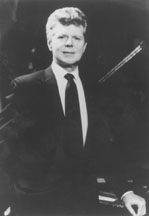American Sputnik
Pianist Van Cliburn's early triumph in Moscow has made him a rare, bankable star of classical music
By Philip Collins
HE BEGAN PIANO lessons at age 3. Twenty years later, he was the subject of a ticker-tape parade in New York, the only one ever held in honor of a classical musician--after all, nobody had expected a 23-year-old American student from Juilliard to steal the gold at the First International Tchaikovsky Competition in Moscow, and with a performance of Tchaikovsky's
Piano Concerto No. 1, no less.
From that moment on, Van Cliburn would be recognized as one of America's most bankable musical superstars. Deservedly so, for he had bested the Russians at their own game during the peak of Cold War hostilities; he was even nicknamed "the American Sputnik." Cliburn and Tchaikovsky's Concerto No. 1 have been inseparable ever since. The work grew to be pianist's trademark, and his 1958 recording of it was the first classical record to go platinum.
Two decades later, Cliburn would again shock the music world by announcing his withdrawal from performing. His sabbatical surprised many, but Cliburn's reputation for eccentricities had created a popular mystique that thrived on contradictions (excepting his repertoire, which was remarkably staid). Here was an artist who neither smoked nor drank, and routinely began his recitals with "The Star Spangled Banner" (one of America's greatest classical works, he has said, although the music is actually English in origin). Furthermore, he wrote poetry and was labeled "vegetarian" (erroneously so) because of his finicky dietary requirements on tour. So it wasn't completely unprecedented that Cliburn--like the late Glenn Gould--withdrew from concertizing.
In 1987, Cliburn made an aptly auspicious comeback with a recital at the White House featuring the pianist's sung rendition of Moscow Nights, in honor of the visiting Mikhail Gorbachev. This appearance was followed by a performance at Carnegie Hall's 100th Anniversary Concert with the New York Philharmonic and numerous other high-profile engagements.
CLIBURN WILL perform his signature piece with the San Jose Symphony in a gala concert this Saturday (Sept. 21). As some might already know, this won't be the first time that Cliburn has performed at the San Jose Center for the Performing Arts. "I remember playing a recital there in 1977," he says. "I enjoyed the ambiance immensely, and the acoustics were wonderful. I really look forward to returning."
It was shortly after the San Jose recital that Cliburn began his nine-year sabbatical from the stage. The pianist downplays the significance of the hiatus, alluding to it as a mere phase in his career, wherein musical development continued, but away from public scrutiny.
"A classical career is not like one in entertainment," he tells me. "I embarked at 3, played for the first time with an orchestra at 12, and then with the New York Philharmonic by 20. It's a lifetime vocation, but you're not necessarily on the stage the whole time. Your relationship with your instrument is very special, but it doesn't rule you; you decide the things that are important in life."
During his time away from the stage, Cliburn indulged in his favorite repertoire, opera, while continuing his keyboard rigors. With financial freedom and epicurean tastes, he visited the great opera houses of the world, hearing his favorite divas and enjoying a kind of leisure that had been unavailable to him during his prodigal years.
"It was heavenly; I had the time of my life," he says. "I was able to take time to think, and quietly practice."
When asked in what ways the sojourn had affected his interpretations of Tchaikovsky's "First" and other works, Cliburn waxed into generalities. "You're always rediscovering. There are no twice-told tales. Each time you play a piece it's a variable circumstance. There are many ways to say the same thing, and I am always searching for new ways to make it clear."
Clarity is central to Cliburn's playing; with commendable consistency he has resisted the popular practice of overpersonalizing the romantic repertoire. His Tchaikovsky is limber, lean, yet sumptuous, shaded in degrees of expression that mirror perfectly the concerto's bold contrasts and elastic profiles. Cliburn accredits his discerning pedal work and vocally oriented phrasing as seminal to his unique approach.
"I believe that the pedal is the soul to the piano," he says. "It gives the instrument breath. I treat the hands as if they were voices. The keys resonate like a choir of voices, and you gauge tempi to fit the circumstances. One has to find the best speed for comprehension."
Cliburn puts communication first in his musicmaking. He is committed to realizing the ultimate expression of each composition's design. "You must be able to convey the music's architecture; it's incumbent to be faithful to the composer," he says. "As you work at a piece, you gain increased awareness and keep striving for the unattainable [and] attempt to catch hold of the infinite."
Saturday's concert--the second all-Russian program this month--will be conducted by Music Director Leonid Grin. In addition to the Tchaikovsky, the lineup includes such easy-listening classics as Shostakovich's Festive Overture, Mussorgsky's Prelude and Dance of the Persian Maidens from Khovanshchina, Borodin's Polovtsian Dances from Prince Igor, and an arrangement of Borodin's Nocturne from String Quartet No. 2 (orchestrated by Rimsky-Korsakov).
[ Metro | Metroactive Central | Archives ]
This page was designed and created by the Boulevards team.

Maestro of Contradictions: Van Cliburn's long career embraces many eccentricities.
Van Cliburn appears with the San Jose Symphony Saturday (Sept. 21) at 8pm (cocktails at 5:30pm; dinner at 6:30pm; postconcert reception at 10pm) at the San Jose Center for the Performing Arts, 255 Almaden Blvd., San Jose. Tickets are $25$75 ($200$250 for full gala events). (BASS)
From the September 19-25, 1996 issue of Metro
![[Metroactive Music]](/music/gifs/ma-music.gif)